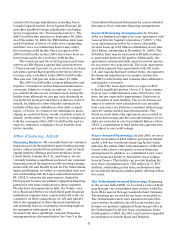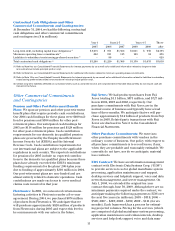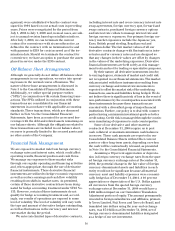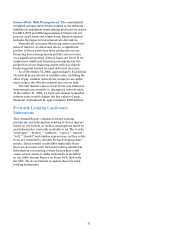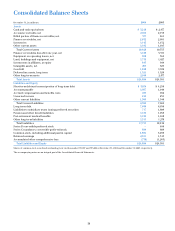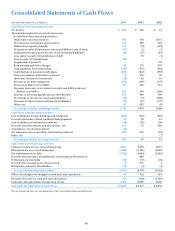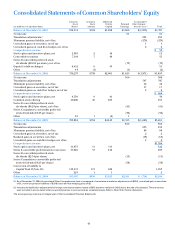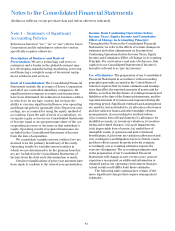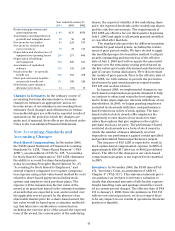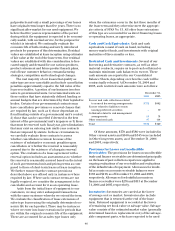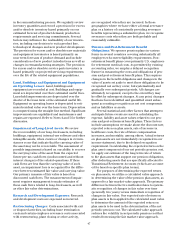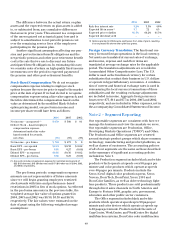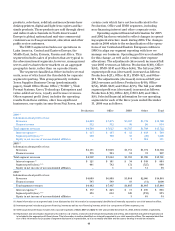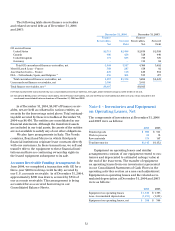Xerox 2004 Annual Report Download - page 45
Download and view the complete annual report
Please find page 45 of the 2004 Xerox annual report below. You can navigate through the pages in the report by either clicking on the pages listed below, or by using the keyword search tool below to find specific information within the annual report.
43
Year ended December 31,
2004 2003 2002
Restructuring provisions and
asset impairments $86 $176 $670
Amortization and impairment of
goodwill and intangible assets 38 36 99
Provisions for receivables 86 224 353
Provisions for obsolete and
excess inventory 73 78 115
Depreciation and obsolescence of
equipment on operating leases 210 271 408
Depreciation of buildings
and equipment 305 299 341
Amortization of capitalized
software 134 143 249
Pension benefits — net periodic
benefit cost 350 364 168
Other post-retirement benefits —
net periodic benefit cost 111 108 120
Deferred tax asset valuation
allowance provisions 12 (16) 15
Changes in Estimates: In the ordinary course of
accounting for items discussed above, wemake
changes in estimates as appropriate, and as we
become aware of circumstances surrounding those
estimates. Such changes and refinements in estima-
tion methodologies are reflected in reported results of
operations in the period in which the changes are
made and, if material, their effects are disclosed in the
Notes to the Consolidated Financial Statements.
New Accounting Standards and
Accounting Changes
Stock-Based Compensation: In December 2004,
the FASB issued Statement of Financial Accounting
Standards No. 123R, “Share-Based Payment” (“FAS
123R”), an amendment of FAS No. 123, “Accounting
for Stock-Based Compensation.” FAS 123R eliminates
the ability to account for share-based payments
using Accounting Principles Board Opinion No. 25,
“Accounting for Stock Issued to Employees,” and
instead requires companies to recognize compensa-
tion expense using a fair-value based method for costs
related to share-based payments including stock
options and employee stock purchase plans. The
expense will be measured as the fair value of the
award at its grant date based on the estimated number
of awards that are expected to vest, and recorded over
the applicable service period. In the absence of an
observable market price for a share-based award, the
fair value would be based upon a valuation methodol-
ogy that takes into consideration various factors,
including the exercise price of the award, the expected
term of the award, the current price of the underlying
shares, the expected volatility of the underlying share
price, the expected dividends on the underlying shares
and the risk-free interest rate. The requirements of
FAS 123R are effective for our third quarter beginning
July 1, 2005 and apply to all awards granted, modified
or cancelled after that date.
The standard also provides for different transition
methods for past award grants, including the restate-
ment of prior period results. We have elected to apply
the modified prospective transition method to all past
awards outstanding and unvested as of the effective
date of July 1, 2005 and will recognize the associated
expense over the remaining vesting period based on
the fair values previously determined and disclosed as
part of our pro-forma disclosures. We will not restate
the results of prior periods. Prior to the effective date of
FAS 123R, we will continue to provide the pro-forma
disclosures for past award grants as required under
FAS 123 and as shown below.
In January 2005, we implemented changes in our
stock-based compensation programs designed to help
us continue to attract and retain the best employees,
and to better align employee interests with those of our
shareholders. In 2005, we began granting employees
restricted stock awards with time- and performance-
based restrictions in lieu of stock options. The time-
based restricted stock awards offer employees the
opportunity to earn shares of our stock over time,
rather than options that giveemployees the right to
purchase stock at a set price. The performance-based
restricted stock awards are a form of stock award in
which the number of shares ultimately received
depends on our performance against certain specified
and predetermined financial performance targets.
The issuance of FAS 123R is expected to result in
stock option-based compensation expense in 2005 of
approximately $28 ($17 after-tax or $0.02 per diluted
share). The effect of the changes in our stock-based
compensation program is not expected to be material
in 2005.
Inventory: In November 2004, the FASB issued FAS
151, “Inventory Costs, an amendment of ARB 43,
Chapter 4” (“FAS 151”). This statement amends previ-
ous guidance as it relates to inventory valuation to
clarify that abnormal amounts of idle facility expense,
freight, handling costs and spoilage should be record-
ed as current-period charges. The effective date of FAS
151 is January 1, 2006. Since the guidance in FAS 151
reflects our current practices, we do not expect there
to be any impact on our results of operations, financial
position or liquidity.


